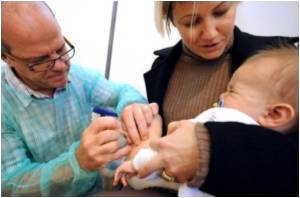A common vaccine is at the center of a debate taken to the US Supreme Court, that would impact the pharmaceutical industry as charges are made of side effects on childhood development.

The justices have agreed to decide whether the case can proceed despite a law that largely exempts the makers of vaccines from liability, which the industry said was needed to encourage drugmakers to continue producing the products.
The family contends in their lawsuit that Hannah began getting seizures and that her development was affected after she received a third dose of the DTP vaccine in 1992.
Their lawyer David Frederick said the vaccine was pulled off the market in 1998 but that Wyeth continued to use the flawed vaccine for years.
The issue of side effects from vaccines has been controversial. A number of parents contend that some vaccines have led to autism in children although studies show no definitive link.
Kathleen Sullivan, attorney for Wyeth, which is now a unit of Pfizer, told the justices that allowing these kinds of lawsuits would "drive manufacturers out of the market" for vaccines.
Advertisement
In questioning the attorneys, Justice Sonia Sotomayor suggested that this offered little incentive for a vaccine maker to withdraw a harmful product: "What would be the motivations for a manufacturer to voluntarily remove a drug that could cause harm?" she asked.
The newest member of the Supreme Court, Elena Kagan, recused herself from the case.
Source-AFP









